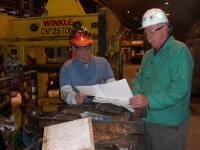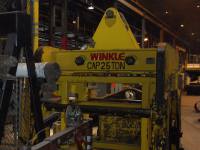Improving safety practices takes management leadership, but it’s also a group effort.
Kevin Lhota was still fresh in the job as production and maintenance senior leader at the ATI Allegheny Ludlum steel mill in Bagdad, PA, the first time he watched the roll change operation at the plant’s rolling mill. A routine maintenance task for the mill, changing rolls on the Bliss Rolling Mill was a challenging procedure that involved a crew team of 3, plus a crane operator.

“I could see it was a place to start implementing our new ‘hands-free’ policy for heavy mill operations,” he recalls. “We needed a better idea for maneuvering and handling the rolls, so that’s when I thought we should get Winkle Industries involved.”
Lhota took his observations to management and the ATI engineering team began its analysis of the roll change procedures. Videos of the operation assisted in identifying where and why crew members were engaged “hands on” with the process. ATI then asked Tom “Ski” Polczynski, regional sales manager from Winkle Industries, to consult with his material handling specialists.
“I knew Winkle Industries from working with them at our Specialty Plate Operations in Washington, PA,” says Lhota. “When they say they specialize in providing engineered solutions for mill-duty material handling equipment, they mean it!”
Precision Handling at 30,000 lb
Polczynski came to the ATI Bagdad plant site with a design team accompanied by Winkle’s affiliate engineering company, ProEn. Lhota reviewed the changeout procedure with the Winkle and ProEn team.
“We are running a 3-stand tandem rolling mill. We change out the 6 backup rolls that range from 33 to 39 in. each at least once a week. Each time, we pull out the roll assembly from each mill stand. Each of these rolls weighs about 21,000 lb, and we have about 40 thousands of an in. (0.040 in.) clearance to fit them in,” says Lhota.
The team saw two areas the new solution would have to address. First, the crane man couldn’t see any of the activity on that side of the mill so he relied on hand signals to know which way to go. And second, the new rolls have to line up precisely and the slings would need to be eliminated. Although very tight, the crew would need a ‘hands-off’ method to line it up.
Hands-Free Roll Changing
For Lhota, developing a new roll change procedure would take the Bagdad Mill a step closer to meeting ATI Allegheny’s 'hands-free' goal. The Winkle and ProEn team visited the plant frequently over several months to design alternative approaches.

“There were several brainstorming meetings in order to determine a method for handling and aligning the rolls,” Polczynski recalls. He and the ProEn team pored over the mill’s drawings for details and consulted extensively with ATI Allegheny Ludlum Bagdad plant personnel to narrow down to the best practice. (Shown left, the Winkle Industries roll changer.)
The final design proposal, which allowed for thermal growth in aligning lifter pins while roll chocks were within specific temperature ranges, passed through several iterations.
“At one point,” says Lhota, “we collectively felt we had the absolute no-fail way to do it, but we were concerned that the process would be too cumbersome. We had to keep looking. The ultimate solution came about when minor mechanical refinements were made to the proposed lifter design.
“A decision was made to make a target radius as generous as possible. When the load comes down, our crews don’t have to go anywhere near the lift! It finds its own center without the support of our crews.”
Success on the First Try
Polczynski was pleased with the final result, too. Winkle’s factory in Alliance, OH, manufactured the lifter from the engineered drawings supplied by ProEn. The lifter was delivered one day, and in service the next.
“First time around,” says Polczynski, “it worked perfectly!”
The new roll change system has been in place for two years, and the ATI Bagdad crews have adopted it wholeheartedly.
“We knew the crews may be resistant to change the past roll-handling practice. Therefore, we took a full day to introduce the concept to everyone – all three ATI shifts were in for a day with the collective design team. They had a half-day to walk through the first roll change with the ProEn engineers, and took right to it. Now, the ATI crews want nothing to do with slings!”
Kevin Lhota is especially proud that the new lifter moves the procedure from 100% hands-on to essentially hands-free, with no loss in mill operational availability.
“We were actually prepared to accept a more lengthy roll change process to achieve a safer roll change process,” says Lhota. “However, the crews are still able to complete the roll change well within the same timeframe.”
For Tom Polczynski, the Bagdad roll changer is a demonstration of his firm’s commitment to sound engineered solutions for mill duty material handling applications.
“We live for projects like this,” he beams. “Kevin brought fresh eyes to a situation in his plant, and we were able to bring fresh eyes to the solution. Safety and productivity take on a whole new meaning in the mill world – and that’s our world, too.”





